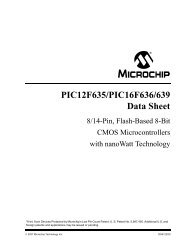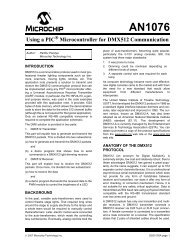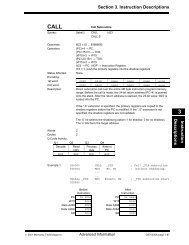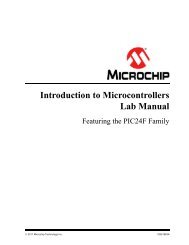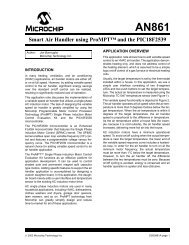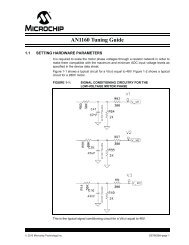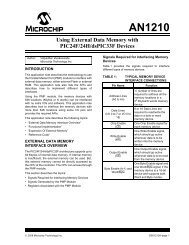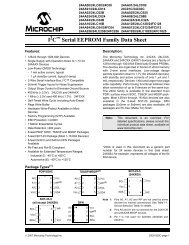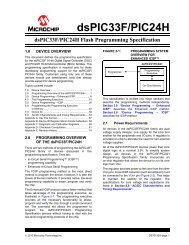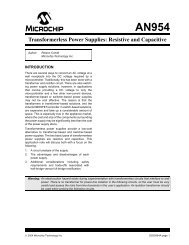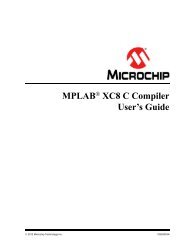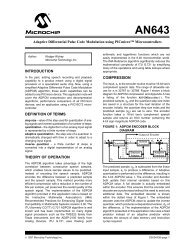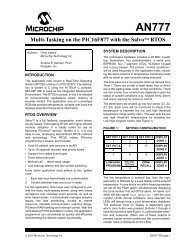MPLAB C Compiler for PIC24 MCUs and dsPIC DSCs ... - Microchip
MPLAB C Compiler for PIC24 MCUs and dsPIC DSCs ... - Microchip
MPLAB C Compiler for PIC24 MCUs and dsPIC DSCs ... - Microchip
Create successful ePaper yourself
Turn your PDF publications into a flip-book with our unique Google optimized e-Paper software.
16-Bit C <strong>Compiler</strong> User’s Guide<br />
3.5.5 Options <strong>for</strong> Debugging<br />
The following options are used <strong>for</strong> debugging.<br />
TABLE 3-7: DEBUGGING OPTIONS<br />
Option Definition<br />
-g Produce debugging in<strong>for</strong>mation.<br />
The compiler supports the use of -g with -O making it possible<br />
to debug optimized code. The shortcuts taken by optimized code<br />
may occasionally produce surprising results:<br />
• Some declared variables may not exist at all;<br />
• Flow of control may briefly move unexpectedly;<br />
• Some statements may not be executed because they<br />
compute constant results or their values were already at<br />
h<strong>and</strong>;<br />
• Some statements may execute in different places because<br />
they were moved out of loops.<br />
Nevertheless it proves possible to debug optimized output. This<br />
makes it reasonable to use the optimizer <strong>for</strong> programs that might<br />
have bugs.<br />
-Q Makes the compiler print out each function name as it is<br />
compiled, <strong>and</strong> print some statistics about each pass when it<br />
finishes.<br />
-save-temps Don’t delete intermediate files. Place them in the current directory<br />
<strong>and</strong> name them based on the source file. Thus, compiling<br />
foo.c with -c -save-temps would produce the following<br />
files:<br />
foo.i (preprocessed file)<br />
foo.p (pre procedure abstraction assembly language file)<br />
foo.s (assembly language file)<br />
foo.o (object file)<br />
3.5.6 Options <strong>for</strong> Controlling Optimization<br />
The following options control compiler optimizations.<br />
TABLE 3-8: GENERAL OPTIMIZATION OPTIONS<br />
Option Definition<br />
-O0 Do not optimize. (This is the default.)<br />
Without -O, the compiler’s goal is to reduce the cost of compilation<br />
<strong>and</strong> to make debugging produce the expected results.<br />
Statements are independent: if you stop the program with a<br />
breakpoint between statements, you can then assign a new<br />
value to any variable or change the program counter to any<br />
other statement in the function <strong>and</strong> get exactly the results you<br />
would expect from the source code.<br />
The compiler only allocates variables declared register in<br />
registers.<br />
-O<br />
-O1<br />
Optimize. Optimizing compilation takes somewhat longer, <strong>and</strong><br />
a lot more host memory <strong>for</strong> a large function.<br />
With -O, the compiler tries to reduce code size <strong>and</strong> execution<br />
time.<br />
When -O is specified, the compiler turns on<br />
-fthread-jumps <strong>and</strong><br />
-fdefer-pop. The compiler turns on<br />
-fomit-frame-pointer.<br />
DS51284H-page 46 © 2008 <strong>Microchip</strong> Technology Inc.





